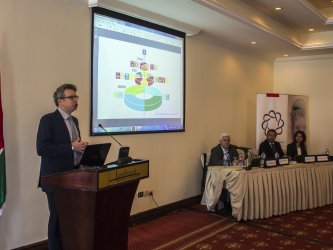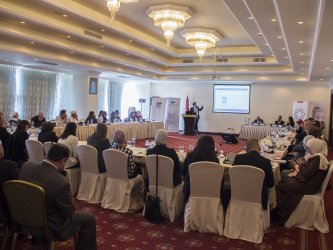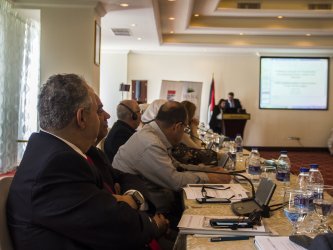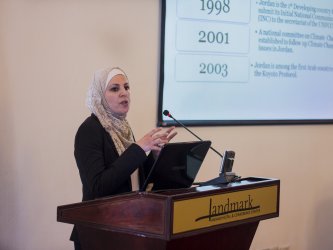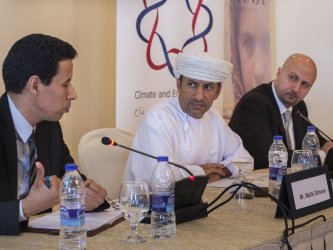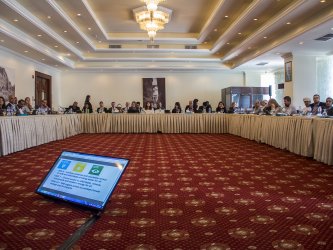-
Translating the Sustainable Development Goals into ...
Translating the Sustainable Development Goals into Implementation Policy
On April 24, the West Asia - North Africa Institute (WANA) and Friedrich-Ebert-Stiftung (FES) brought together 50 key stakeholders from Jordan and the Arab region to share SDG implementation opportunities. The conference marked the beginning of a series of roundtable discussions to recommend ways forward for the national implementation of the water, energy and climate change strategies in Jordan and beyond.
The 17 Sustainable Development Goals (SDGs) were adopted by a high-level plenary meeting of the UN General Assembly on September 27, 2015. For the West Asia - North Africa (WANA) region, the SDGs are particularly great news as they call for immediate action at both the international and national level.
This change in approach is particularly important as international actors have long dominated sustainable development, leaving little space for state-based empirical approaches. "The SDGs advocate national ownership,” Dr. Muhammad Saidam, Chief Scientist at the Royal Scientific Society, noted.
“Since the 2030 Agenda for Sustainable Development does not include proposals for national implementation, we need to adapt the SDGs to local conditions in Jordan and increase local accountability,” he continued. “Science, society and policy makers will have to cooperate to implement them.”
The WANA Institute and FES decided to focus on SDG6, SDG7 and SDG13, three goals related to water, energy and climate change. These fields are highly interrelated, so an integrated approach is needed to tackle problems related to them.
“Energy, Water and the aspect of Climate Change are cross-cutting issues that are fundamental to all of the Sustainable Development Goals and central to development, security and poverty reduction,” said Richard Probst, Regional Coordinator of FES at the sideline of the event.
SDG 6: Ensuring access to water and sanitation for all
The water crisis in the region is extremely pressing, as Arab states have the lowest freshwater availability per capita of any region in the world. Poorly regulated wastewater, solid waste disposal, and unregulated industry increasingly pollute water reserves and compromise ecosystems. Water pollution and unsafe waste disposal also have attendant consequences for health, urban poverty and reduced productivity.
Indisputably, this situation will continue to worsen. Population growth will increase demand for water both directly and indirectly through energy and food. The effects of climate change, such as extreme weather events and seawater intrusion, will also aggravate each of these challenges.
Dr. Voïta Thibaud, United Nations SDG Expert, stated that “solar-powered desalination is one of the main opportunities for Jordan to address SDGs 6, 7 and 13 at the same time. In addition, using wastewater as biomass could increase Jordan’s renewable energy capacities.”
Water efficiency levels should also be increased. Jordan’s aged water infrastructure, for example, means that the country loses at least 65 litres/capita/day. Over-pumping of water tables and improper irrigation practices must be disincentivised or sanctioned.
Action plans must take into account the inter-sectorial nature of water, including tourism, agriculture, industry, health and social protection. Pricing policies and subsidies must encourage efficient use of water in the agricultural sector, complemented by encouraging farming in better performing crops and creating new jobs outside of the agricultural sector.
SDG 7 and 13: The energy and climate change challenges
SDG 7 aims to “ensure access to affordable, reliable, sustainable, and modern energy for all”. Energy is a cross-cutting issue that is fundamental to all Sustainable Development Goals and central to development, security and climate change challenges, as access to energy underpins all aspects of human well-being, be it health, education, food production, transportation, communication and any productive activity.
Aiming to implement this SDG will also help in implementing the Paris Agreement which calls on countries to keep global temperatures from rising above 2°C this century, hoping to further push for 1.5°C.
Jordan is one of the few energy resource poor countries in the Middle East. However, Jordan does enjoy quality solar and wind energy. With wind speeds reaching between 7.5 to 11.5 m/s in some places, wind projects are not only feasible, but competitive. The high solar radiation of 5 – 7 kWh/m2 per day with about 300 sunny days per year makes solar energy Jordan’s most promising future renewable energy source.
Many current projects are aimed at building solar power and wind power capacities in an effort to the set target of 10% of the country’s primary energy mix by 2020. According to Ruba Al Zubi, CEO of EDAMA “businesses also play a role in accelerating the transition to an affordable, reliable and sustainable energy system by investing in renewable energy resources.”
Photos by Mo'taz Sulaiman

